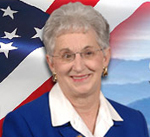Congresswoman Virginia Foxx (R-NC) delivered the following remarks in the US House of Representatives in the House of Representatives on May 19, 2009:
128TH ANNIVERSARY OF THE BIRTH OF MUSTAFA KEMAL ATATÜRK FOUNDER OF MODERN TURKEY
"Madam Speaker, I rise today, May 19, to commemorate the 128th anniversary of the birth of Mustafa Kemal Atatürk, the founder of modern Turkey. Atatürk was a unique and inspirational figure who laid the foundation for the Republic of Turkey. He was a post World War I revolutionary leader who understood that Islam and modernity are not inconsistent--an important factor to reinforce today with democratic leaders throughout the Muslim world.
By any measure, Atatürk was an historic reformer. In the space of two decades, he built the nation of Turkey from the ashes of the Ottoman Empire--a nation that was based on secular principles and with a foundation that was fertile for democracy to take root and prosper. He held true to his fundamental vision for his overwhelmingly Muslim nation, namely that it be guided by two overarching concepts: secularism and progress. Just as is the case today, he understood that advances in science and technology would enhance the nation and the Turkish people.
To enable Turkey to reap the benefits of such advances, he set about enacting major reforms in all aspects of Turkish life--political, cultural, legal, educational, and economic all with an eye toward creating the architecture of the new Turkish nation that would raise it to the level of what Atatürk referred to as İcontemporary civilization.'' These reforms touched on all aspects of Turkish society from abolishing the caliphate, recognizing equal rights for men and women, replacing the Arabic alphabet with Latin letters, and instituting secular law to reforming traditional styles of dress and mandating surnames.
Atatürk was an impatient reformer. His handling of the reform of the alphabet is one example of his impatience. The language commission he appointed to review the reform recommended that the alphabet reforms be phased in over a fifteen year period. Atatürk had a much different timeframe in mind. He set about traveling throughout the country, personally instructing crowds in the new alphabet, and within six months he had accomplished his goal. With the acceptance of the Latin alphabet, millions of Turks would be poised to turn westward for their second languages and the learning to which those languages are the key.
Atatürk championed women's rights, encouraging them to pursue careers as doctors, lawyers, scientists, writers and politicians. He did so because he wisely understood that by doing so he was unleashing the talents of all Turks and thereby making the nation stronger. Because of his vision and determination, Turkey is today a strong and vibrant democracy and a model for others in the Islamic world to emulate.
Madam Speaker, it is my hope that Muslim leaders throughout the region will reacquaint themselves with Atatürk's revolutionary leadership and take inspiration in the courageous reforms he undertook more than seventy years ago so that they too can preside over nations that are secular, democratic and prosperous.















































